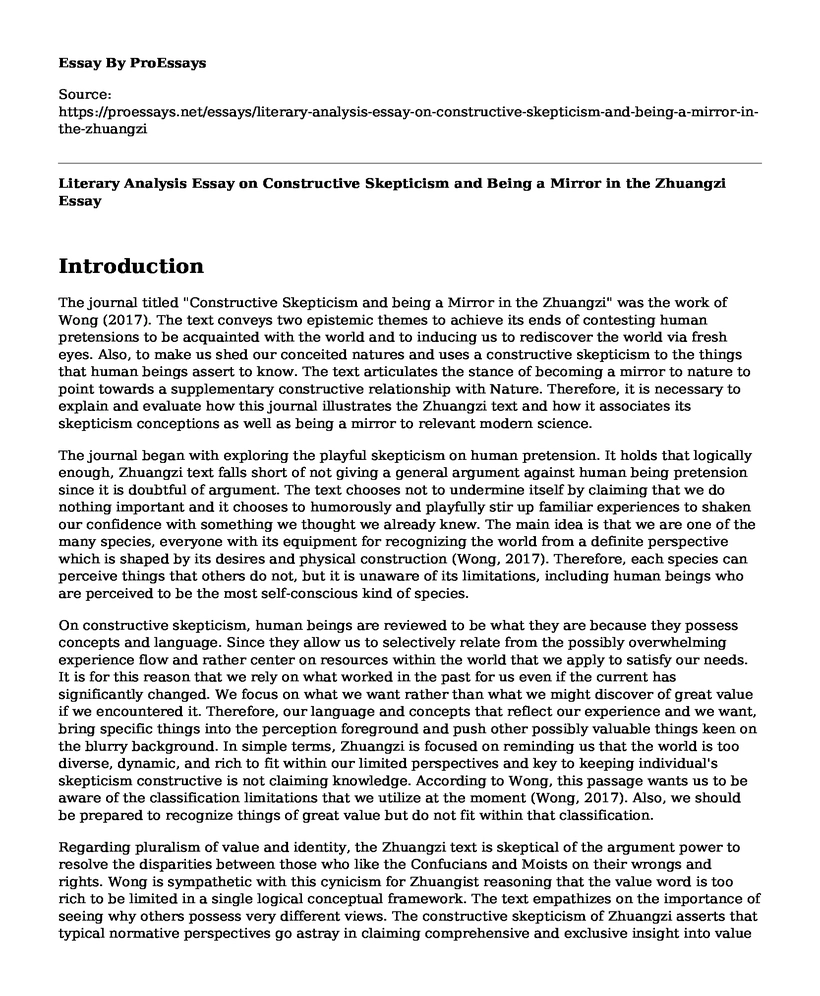Introduction
The journal titled "Constructive Skepticism and being a Mirror in the Zhuangzi" was the work of Wong (2017). The text conveys two epistemic themes to achieve its ends of contesting human pretensions to be acquainted with the world and to inducing us to rediscover the world via fresh eyes. Also, to make us shed our conceited natures and uses a constructive skepticism to the things that human beings assert to know. The text articulates the stance of becoming a mirror to nature to point towards a supplementary constructive relationship with Nature. Therefore, it is necessary to explain and evaluate how this journal illustrates the Zhuangzi text and how it associates its skepticism conceptions as well as being a mirror to relevant modern science.
The journal began with exploring the playful skepticism on human pretension. It holds that logically enough, Zhuangzi text falls short of not giving a general argument against human being pretension since it is doubtful of argument. The text chooses not to undermine itself by claiming that we do nothing important and it chooses to humorously and playfully stir up familiar experiences to shaken our confidence with something we thought we already knew. The main idea is that we are one of the many species, everyone with its equipment for recognizing the world from a definite perspective which is shaped by its desires and physical construction (Wong, 2017). Therefore, each species can perceive things that others do not, but it is unaware of its limitations, including human beings who are perceived to be the most self-conscious kind of species.
On constructive skepticism, human beings are reviewed to be what they are because they possess concepts and language. Since they allow us to selectively relate from the possibly overwhelming experience flow and rather center on resources within the world that we apply to satisfy our needs. It is for this reason that we rely on what worked in the past for us even if the current has significantly changed. We focus on what we want rather than what we might discover of great value if we encountered it. Therefore, our language and concepts that reflect our experience and we want, bring specific things into the perception foreground and push other possibly valuable things keen on the blurry background. In simple terms, Zhuangzi is focused on reminding us that the world is too diverse, dynamic, and rich to fit within our limited perspectives and key to keeping individual's skepticism constructive is not claiming knowledge. According to Wong, this passage wants us to be aware of the classification limitations that we utilize at the moment (Wong, 2017). Also, we should be prepared to recognize things of great value but do not fit within that classification.
Regarding pluralism of value and identity, the Zhuangzi text is skeptical of the argument power to resolve the disparities between those who like the Confucians and Moists on their wrongs and rights. Wong is sympathetic with this cynicism for Zhuangist reasoning that the value word is too rich to be limited in a single logical conceptual framework. The text empathizes on the importance of seeing why others possess very different views. The constructive skepticism of Zhuangzi asserts that typical normative perspectives go astray in claiming comprehensive and exclusive insight into value (Wong, 2017). Also, it encourages us to enlarge our perspective of what other commitments possess a similar status.
It may be objected that Wong interpretation of Zhuangist manner of responding to values within tension with each other takes morality too seriously. Wong suggests that the text should be approached in a way that the reader receives are the skeptical interrogations of every voice. He is inclined to embrace the voice of accepting that it does not stand the imprint of unassailable and eternal truth, in which identification with Nature as a whole is identification with a whole that comprises of love and duty (Wong, 2017). Therefore, one should not take Zhuangist constructive skepticism point as eventually rejecting all value commitment. We are then encouraged to look beyond our commitment and we shall see the things we are not committed to and Wong refers to this as becoming a mirror.
Conclusion
In conclusion, the "Constructive Skepticism and being a Mirror in the Zhuangzi" is a very interesting and educative journal. Wong systematically analyzes the Zhuangzi text. It is vivid from the discussion that human beings, the most self-conscious species perceive things that other species do not, but they are unaware of their limitations. We should then be aware of the classification limitations that we utilize at the moment and be prepared to recognize things of great value but do not fit within that classification. Therefore, it is necessary looking beyond our commitment and we shall realize the things we are not committed to, are of great value.
Reference
Wong, D. B. (2017). Constructive Skepticism and being a Mirror in the Zhuangzi. Journal of Chinese Philosophy.
Cite this page
Literary Analysis Essay on Constructive Skepticism and Being a Mirror in the Zhuangzi. (2023, Mar 14). Retrieved from https://proessays.net/essays/literary-analysis-essay-on-constructive-skepticism-and-being-a-mirror-in-the-zhuangzi
If you are the original author of this essay and no longer wish to have it published on the ProEssays website, please click below to request its removal:
- Hamlet Moral Responsibility and Truth - A Literary Essay
- Unicorns Essay Example
- A Letter to Her Husband, Absent Upon Public Employment by Anne Bradstreet Essay
- Literary Analysis Essay on Brave New World by Aldous Huxley
- Identity Crisis as Kurtz's Problem in Heart of Darkness by Joseph Conrad Essay
- Hamlet Obituaries Essay
- Paper Example: Wildness in Bell Hooks' Legacy







